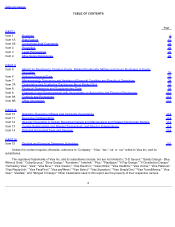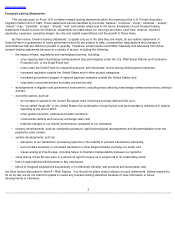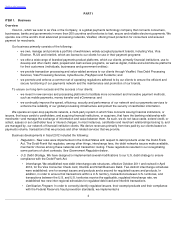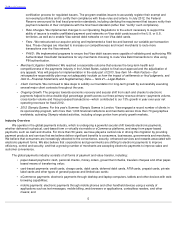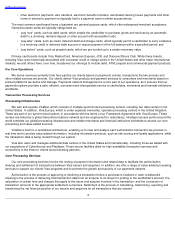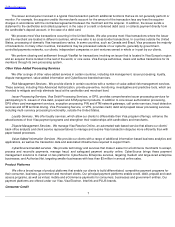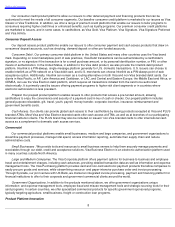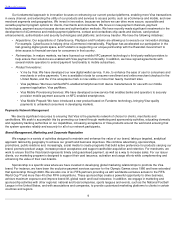Visa 2012 Annual Report Download - page 14
Download and view the complete annual report
Please find page 14 of the 2012 Visa annual report below. You can navigate through the pages in the report by either clicking on the pages listed below, or by using the keyword search tool below to find specific information within the annual report.
Table of Contents
reimbursement fees may have a material, adverse impact on our financial condition, revenues, results of operations, prospects for
future growth and overall business .
The United States is not the only jurisdiction to regulate debit interchange reimbursement fees. For example, the Reserve
Bank of Australia has enacted a regulation limiting the costs that can be considered in setting interchange reimbursement fees for
both our credit and our debit cards.
Interchange reimbursement fees represent a transfer of value among the financial institutions participating in an open-loop
payments network such as ours. On purchase transactions, interchange reimbursement fees are paid to issuers by acquirers in
connection with transactions initiated from products in our payments system. We generally do not receive any portion of
interchange reimbursement fees in a transaction. They are, however, a factor on which we compete with other payments providers
and are therefore an important determinant of the volume of transactions we process.
Default interchange reimbursement fees are an important driver of system volume and value. They promote the efficient
operation of our payments network by enabling both the issuer and the acquirer to understand the economics of a given transaction
before entering into it and by giving our clients an alternative to negotiating transfer pricing with each other. By establishing and
modifying default interchange rates in response to marketplace conditions and strategic demands, we seek to ensure a competitive
value proposition for transactions using our cards in order to encourage electronic transactions and to maximize participation in the
Visa payments system by issuers and acquirers and, ultimately, consumers and merchants. We believe that proper management of
interchange rates benefits consumers, merchants, our financial institution clients and us by promoting the overall growth of our
payments network in competition with other payment card systems and other forms of payment, and by creating incentives for
innovation, enhanced data quality and security.
Merchants do not directly pay interchange reimbursement fees. A merchant's cost of acceptance is determined by its acquirer
and is called a merchant discount or merchant discount rate. The merchant discount typically covers the costs that acquirers incur
for participation in open-loop payments networks, including those relating to interchange, and compensates them for various other
services they provide to merchants. Merchant discount rates and other merchant fees are set by our acquirers without our
involvement and by agreement with their merchant clients and are established in competition with other acquirers, other payment
card systems and other forms of payment. We do not establish or regulate the level of merchant discount rates or any other fees
charged by our acquirers. In some cases, such as India, the governing authorities have regulated the merchant discount rate itself,
rather than the interchange reimbursement fee.
Network Exclusivity and Routing. We have historically had agreements with some issuers under which they agree to issue
certain payment cards that use only the Visa network or receive incentives if they do so. In addition, issuers of some debit products
outside the United States have historically chosen to include only the Visa network. We refer to these various practices as network
exclusivity. The Dodd-Frank Act limits our and issuers' ability to impose rules for, or choose various forms of, network exclusivity
and preferred routing in the debit area. See Item 1A— The Dodd-
Frank Act may continue to have a material, adverse impact on our
financial condition, revenues, results of operations, prospects for future growth and overall business .
As another example, the Canadian Ministry of Finance has implemented a voluntary Code of Conduct for payment card
industry participants, with which Visa has agreed to comply. Among other things, the Code of Conduct prohibits certain restrictions
on merchants' choice of payment options they will accept. See Item 1A—Risk Factors—Additional regulations that prohibit us from
contracting with clients or requiring them to use only our network, or that deny them the option of selecting only our network, may
decrease the number of transactions we process, materially and adversely affecting our financial condition, revenues, results of
operations, prospects for future growth and overall business .
Consumer Financial Protection Bureau. The Dodd-Frank Act created a new independent Consumer Financial Protection
Bureau, with responsibility for most federal consumer protection laws in the area of financial services and new authority with
respect to consumer protection issues, including those pertaining to us to some extent. The bureau's future actions may make
payment card transactions less attractive to card issuers, consumers and merchants by further regulating the industry.
No-Surcharge Rules. We have historically implemented policies that prohibit merchants from charging higher prices to
consumers who pay using Visa instead of other means. Some local jurisdictions have taken steps to limit these no-surcharge rules.
For example, the Reserve Bank of Australia enacted a regulation that prohibited us from enforcing our no-surcharge policy and
effectively allowed merchants to impose discretionary surcharges on Visa
12


